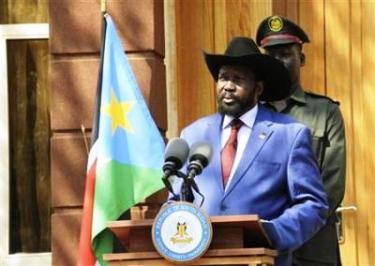Rights groups urge S. Sudan’s Kiir to reject “abusive” security bill
October 14, 2014 (NAIROBI) – South Sudan’s president, Salva Kiir, should veto an “abusive” security bill that gives sweeping powers to the country’s National Security Service (NSS), a group of national and international human rights bodies said in a statement issued on Wednesday.

Rights groups say MPs still disagreed as to whether the security bill had been passed or was still pending a final reading. However, no further changes are expected before the bill is sent to president Kiir to be signed into law, officials told right bodies.
Onyoti Adigo, the minority leader in parliament, described the security bill as being very “suppressive”.
“Even if legislators sign off on this bill, President Kiir should refuse to make it law and send it back to be overhauled after much broader consultation with the public,” said Elizabeth Ashamu Deng, South Sudan researcher at Amnesty International.
“This bill empowers the NSS to continue violations rather than limiting its powers in line with regional and international standards,” she added.
There are widespread concerns that the bill, passed on 8 October, gives NSS officers sweeping powers, including to arrest and detain suspects, yet the Transitional Constitution permits NSS to focus on “information gathering, analysis and advice.”
“The scope of the powers granted to the NSS in this bill flies in the face of international norms and South Sudan’s own constitution, which envisions a service limited to intelligence activities,” said Daniel Bekele, Africa director at Human Rights Watch.
“Instead the bill grants security officers wide powers without judicial oversight or clear limits on when they can use force,” he added.
Opponents of the NSS bill have criticised its authorisations of agents to detain, make unauthorised arrest of suspects in unconstitutionally recognised detention centres without warrant from competent court as well as conducting searches and seizure of properties.
The bill also allows operatives to monitor frequencies, wireless system, publication, broadcasting station and postal services purportedly aimed at preventing misuses of these facilities by the users.
REPRESSIVE LAW
Peter Adwok Nyaba, a former member of the country’s ruling party (SPLM) who joined the opposition led by former vice president Riek Machar, said the government was “digging its grave” by forcing legislators to pass the repressive security bill.
“The regime is digging its grave and should be allowed to do so. It generated and continues to generate contradictions until it will devour its head after finishing the tail. The result of not learning or of unlearning is committing the same mistake many times,” he told Sudan Tribune.
The bill does not for instance specify where the security service could detain people. That omission, rights bodies say, would open the door to secret detention in unknown locations inaccessible to lawyers and family members, and without the possibility of supervision by independent bodies.
“Experiences from other countries show that when you give security services policing powers, there is a high risk of torture and ill-treatment,” said Lutz Oette, counsel for the international anti-torture and human rights organisation, REDRESS.
“This is most worrying where crucial safeguards are missing, such as the need to prohibit secret detention and to make sure that detainees are able to contact lawyers and relatives immediately upon arrest,” added Lutz.
Parliament should amend the bill to require warrants for all acts by the security service, including surveillance, searches, seizures, and arrests that have an effect on protected rights, rights bodies said.
The NSS has reportedly been responsible for some of the worst violations of freedom of expression in South Sudan since the country’s independence, frequently unlawfully detaining and intimidating media workers and cultivating an atmosphere of fear.
With the outbreak of conflict in South Sudan in December 2013, NSS increased censorship of the media and detained several journalists.
“Giving the NSS extraordinary powers without adequate safeguards will lead to abuses of power and violations of human rights,” said Edmund Yakani, coordinator of South Sudan’s Community Empowerment for Progress Organization (CEPO).
“The bill should be sent back to parliament, who should amend it to remove powers for the NSS to arrest, detain, conduct searches, and seize property, and ensure oversight in line with international best practices,” he added.
Meanwhile, national and international right bodies want MPs to amend the NSS bill to limit its powers to gathering intelligence, as envisioned by the country’s Transitional Constitution.
“Powers to arrest, detain, conduct searches, seize property, and use force should be excluded,” they said, stressing that permissible places of detention be specified in the bill.
“[The National Legislative Assembly should] strengthen provisions for judicial oversight by making clear that warrants are required for all acts by NSS that have an effect on protected rights, such as surveillance, conducting searches, seizing property, and making arrests,” the group said.
(ST)
